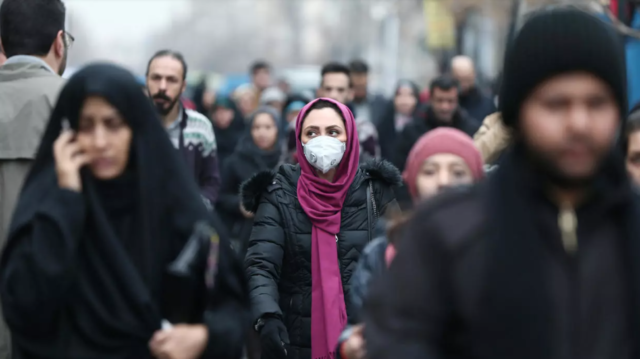If you are Iran, it seems, 2020 is not your year.
Aside from the devastation of the Wuhan virus, Iraq closed its 1,000-mile southern border with Iran for “security reasons” after months of Iraqi protests against Iranian interference in its domestic affairs. Oil prices flirted with zero in the wake of the Russia-Saudi oil war, and demand dropped owing to the virus, further gutting Iran’s treasury. Iran harassed U.S. Navy ships in the Persian Gulf, but according to Navy sources, the action was clearly for domestic consumption and posed no actual threat (although a mistake on either side could have had major repercussions, making President Trump’s warning more than reasonable). Germany, Tehran’s strongest defender in Europe, pulled the plug on Iran’s proxy army Hezb’allah. More than 390 members of the U.S. House of Representatives — including Ilhan Omar, not normally an opponent of the Iranian government — called for extending the international arms embargo against Iran, set to expire in October.
Iran’s Quds Day celebration has been canceled. The rallies and marches, an annual celebration of anti-Semitic glee, with their slogans and speeches and the “death to Israel” chant, will not take place in 2020, although the Iranian public has been assured that the supreme leader will make a speech.
And in Syria, things are blowing up.
That is not unusual. The Syrian civil war — primarily a proxy war for Russia, Turkey, and Iran — decimated the country beginning in 2012. Large-scale fighting ended in 2018, but even now, the Syrian government drops chemical and other weapons on its civilian population in the remaining holdout territory. Turkey has attacked Kurdish enclaves in northern Syria and in March 2020 declared an offensive against the government of Bashar Assad.
Sometimes the source of the bombs is not announced. The Scientific Studies and Research Center in Aleppo, where Western intelligence and opposition sources suspect that Iranian researchers work on chemical weapons, was hit this week. A Hezb’allah base in southern Syria was hit last week, as was an ammunition depot near Homs. Al-Arabiya reported that air strikes targeted sites belonging to the Iranian Revolutionary Guards Corps (IRGC), and, in a Jerusalem Post report, targeted sites included bases for Hezb’allah and the elite Syrian Republican Guard.
While Israel generally neither confirms or denies responsibility for things popping off in Syria, it is true that Israel, undeterred by the domestic ramifications of the Wuhan virus, maintains self-declared “red lines” in Syria:
- Preventing Hezb’allah from acquiring precision weapons systems or chemical weapons
- Preventing Hezb’allah and pro-Iranian groups from deploying along the Syrian border on the Golan Heights, and
- Preventing the Iranian army from creating permanent bases in Syria.
Overlay the red lines on the targets, and the inescapable conclusion is that Israel is continuing to ensure that Iran cannot entrench itself firmly in the wreckage.
Add to this, according to Al-Arabiya, that the air strikes were approved by Russia. Israel has long deconflicted with Russia to a) ensure that Russian assets are not hit and b) keep the conversation over Syria’s future open.
Russia detests Sunni jihadists. It fought two nasty, even criminal wars in Chechnya to stamp out what it perceived as a religious uprising against the State. The understanding that Chechen radicals had joined ISIS in Syria and Iraq pushed Putin to enter the Syrian war. His goal was to crush the Sunni jihadists and to enhance Russia’s air and naval presence in the Mediterranean, as well as its political position, but he was unwilling to commit ground troops to the fight. Iran obliged, at one point managing 80,000+ militiamen, partially comprising Syrians but with large Lebanese Hezb’allah units and Shiite mercenary groups of Pakistanis and Afghans. Iran was said to control more Syrian soldiers than the Syrian government.
But Russia and Iran do not share a common view of the endgame. Putin may hate Sunni jihadists more than Shiite jihadists, but that is a far cry from making them allies. Israel, on the other hand, while abhorring Russia’s material support and defense of Syria’s use of chemical weapons, finds Russia sympathetic to its security requirements. And red lines.
Iran appears the loser here. According to Foreign Policy, “Iran has spent over $30 billion and lost over 2,000 troops in Syria” in pursuit of the “Shiite Crescent,” the land bridge from Iran through Iraq and Syria and Lebanon to the Mediterranean Sea — a “lid” over its enemies Saudi Arabia, Jordan, and Israel.
Now, without the financial resources to pay its proxy army, support its terrorist ally Hezb’allah, and provide the precision weapons and research on new weapons, Iran has no way to replace the assets Israel destroys. With the demise of the IRGC leader Qassem Soleimani, erased by President Trump, Iran has lost its political clout among many of the proxies.
No money.
No Soleimani.
No influence.
No wonder Israeli defense officials see, for the first time since the Syrian war began, Iran going home.






